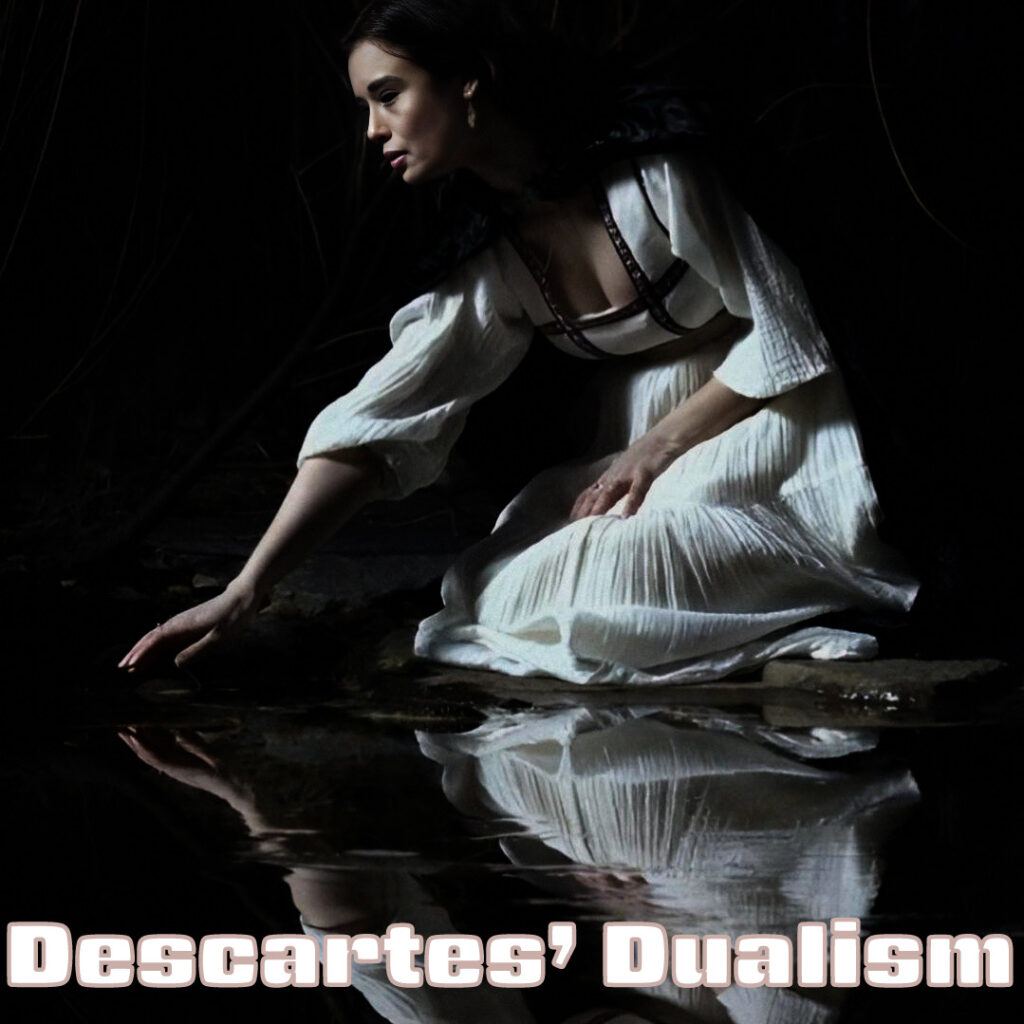As the weekend draws to a close, today is Sunday—a day that often carries a mix of relaxation and anticipation. It’s a time for me to enjoy the last moments of rest while also mentally preparing for the busy week ahead. But as I gear up for the challenges and opportunities that the new week will bring, it’s worth taking a moment to reflect on deeper questions about my existence and the nature of my daily experiences.
Just as Sunday serves as a bridge between the calm of the weekend and the hustle of the workweek, it also offers me a chance to ponder the relationship between my inner thoughts and the physical world I navigate. This balance between rest and readiness mirrors the philosophical inquiries sparked by René Descartes’ mind-body dualism—a concept that challenges me to consider how my immaterial mind interacts with my physical body, shaping my perceptions, actions, and understanding of reality.

The Cogito and the Foundation of Dualism
At the heart of Descartes’ philosophy is his famous dictum, “Cogito, ergo sum” (I think, therefore I am). This statement emerges from Descartes’ method of radical doubt, where he sought to discard any belief that could be subject to the slightest uncertainty. Through this process, he realized that while he could doubt the existence of the external world, his own existence as a thinking being was undeniable. The act of thinking itself confirmed the existence of the self.
This realization led Descartes to distinguish between two fundamental substances: res cogitans (the thinking substance, or mind) and res extensa (the extended substance, or body). The mind, according to Descartes, is an immaterial entity, characterized by thought, consciousness, and self-awareness. In contrast, the body is a material entity, existing in space and governed by physical laws.
The Interaction Problem
One of the most significant challenges arising from Descartes’ dualism is the so-called “interaction problem.” If the mind and body are fundamentally different substances, how do they interact? Descartes suggested that the pineal gland, a small structure in the brain, might be the point of interaction between the two. However, this explanation has been criticized as insufficient and has prompted further exploration into the nature of the mind-body relationship.
Despite these challenges, Descartes’ dualism has had a lasting impact on philosophy, psychology, and even neuroscience. His ideas have influenced how I think about personal identity, the nature of consciousness, and the possibility of life after death.
Legacy and Criticism
While Descartes’ mind-body dualism laid the foundation for much of modern Western philosophy, it has also been the subject of significant criticism. Later philosophers, such as Spinoza and Leibniz, rejected the dualistic framework in favor of monism, the idea that only one substance exists, whether it be mental, physical, or a combination of both.
In the 20th century, the rise of behaviorism and materialism in psychology and philosophy further challenged Descartes’ dualism. These perspectives argue that mental states can be fully explained in terms of physical processes, such as brain activity. The development of neuroscience, which increasingly links cognitive functions to neural mechanisms, has also cast doubt on the dualistic separation of mind and body.
However, some contemporary philosophers and scientists still defend a form of dualism, particularly in discussions about the “hard problem” of consciousness, which questions how subjective experiences arise from physical processes.
Further Implications of Descartes’ Mind-Body Dualism
Descartes’ dualism introduces a clear division between the mental and physical worlds, which raises profound questions about the nature of reality. By positing that the mind and body are fundamentally different, Descartes suggested that my experience of the world is mediated by these two distinct substances. The mind, as the seat of thought and consciousness, interacts with the body but remains separate from it. This leads to an important philosophical inquiry: if the mind is immaterial, how do I gain knowledge of the physical world?
Descartes addressed this question through his theory of innate ideas and the concept of clear and distinct perceptions. He argued that certain truths, such as the existence of God or mathematical principles, are innate to the human mind and are recognized through reason alone, independent of sensory experience. This idea laid the groundwork for rationalism, the philosophical view that reason is the primary source of knowledge.
The Problem of Other Minds
Another significant implication of Descartes’ dualism is the problem of other minds. If the mind is an immaterial substance accessible only to the individual who possesses it, then how can I be certain that other minds exist? This issue stems from the fact that I can only directly observe my own mental states, not those of others. According to Descartes, I can infer the existence of other minds through their physical manifestations, such as speech or behavior, but this remains an inference rather than direct knowledge.
The problem of other minds has become a central topic in the philosophy of mind, leading to various responses, including behaviorism (which equates mental states with observable behaviors) and functionalism (which defines mental states by their functional roles rather than their physical properties).
The Influence on Modern Philosophy and Science
Descartes’ dualism not only influenced philosophical discourse but also shaped the development of modern science. His mechanistic view of the physical world, where the body operates like a machine governed by physical laws, contributed to the rise of modern physics and biology. Descartes’ emphasis on the importance of mathematical reasoning in understanding the physical world laid the foundation for the scientific revolution.
Moreover, Descartes’ dualism prompted the exploration of the mind in a more systematic way, leading to the eventual emergence of psychology as a distinct discipline. His ideas about the mind-body relationship set the stage for later debates about the nature of consciousness, free will, and personal identity.
Ongoing Debates and Alternatives to Dualism
Materialism and Physicalism
One of the most prominent alternatives to Descartes’ dualism is materialism, or physicalism, which asserts that only physical substances exist and that mental phenomena can be fully explained in terms of physical processes. This view gained traction in the 19th and 20th centuries, particularly with the development of neuroscience and the increasing understanding of brain function.
Materialists argue that what I consider as mental states—thoughts, emotions, consciousness—are the result of neural activity in the brain. As such, the mind is not a separate entity but rather a product of the physical brain. This perspective challenges the dualistic notion of an immaterial mind and has led to significant advancements in the study of consciousness, mental illness, and cognitive processes.
Property Dualism and Emergentism
In response to both Cartesian dualism and materialism, some philosophers have proposed intermediate positions such as property dualism and emergentism. Property dualism suggests that while there is only one kind of substance (physical), it can have two kinds of properties: physical properties (like mass and charge) and mental properties (like consciousness). This view attempts to preserve the unique nature of mental phenomena while maintaining a monistic substance framework.
Emergentism, on the other hand, posits that mental states emerge from complex physical systems but are not reducible to them. For example, while consciousness arises from neural processes, it cannot be fully explained by them. Emergent properties are seen as novel and irreducible, meaning that while they depend on the underlying physical structure, they cannot be predicted or explained solely by it.
The Hard Problem of Consciousness
A contemporary issue that continues to challenge both dualism and materialism is the “hard problem” of consciousness, a term coined by philosopher David Chalmers. This problem refers to the difficulty of explaining how and why subjective experiences (qualia) arise from physical processes in the brain. While materialists have made significant progress in understanding the neural correlates of consciousness, the subjective nature of experience remains elusive.
Chalmers and others have suggested that consciousness might be a fundamental aspect of reality, akin to space, time, and matter. This perspective, known as panpsychism, posits that consciousness is a basic feature of all physical entities, though in varying degrees. While this idea diverges from traditional Cartesian dualism, it reflects the ongoing struggle to understand the mind’s place in the natural world.
Conclusion: Descartes’ Enduring Legacy
Descartes’ mind-body dualism continues to be a central topic in both philosophy and science, with its influence felt in discussions about consciousness, identity, and the nature of reality. While many of his specific ideas have been challenged or refined over time, the fundamental questions he raised about the relationship between the mind and body remain as relevant as ever.
His dualism has inspired numerous alternative theories and ongoing debates, each contributing to our evolving understanding of what it means to be a thinking, conscious being in a physical world. Whether through the affirmation, rejection, or modification of his ideas, Descartes’ work continues to be a crucial point of reference in the ongoing exploration of the human mind.
As I savor this day, I use it not only to recharge but also to reflect on the intricate connections between mind and body, thought and action, rest and work. This contemplation can enrich my preparation for the week ahead, helping me to approach it with a clearer, more mindful perspective. Whether I’m planning my schedule, setting goals, or simply enjoying a peaceful moment, I let today be a reminder of the harmony between the mental and physical aspects of my life, ensuring I’m ready to hit the ground running come Monday.
References
1. Descartes, R. (1641). Meditations on First Philosophy.
2. Cottingham, J. (1992). The Cartesian Legacy. Philosophy, 67(262), 141-162.
3. Chalmers, D. (1996). The Conscious Mind: In Search of a Fundamental Theory. Oxford University Press.
4. Searle, J. (1992). The Rediscovery of the Mind. MIT Press.
5. Dennett, D. (1991). Consciousness Explained. Little, Brown and Company.
6. Spinoza, B. (1677). Ethics.
7. Leibniz, G. W. (1714). Monadology.
8. Damasio, A. (1994). Descartes’ Error: Emotion, Reason, and the Human Brain. Avon Books.
9. Chalmers, D. (2002). The Puzzle of Conscious Experience. Scientific American, 281(6), 62-68.
10. Goff, P. (2019). Galileo’s Error: Foundations for a New Science of Consciousness. Pantheon Books.

